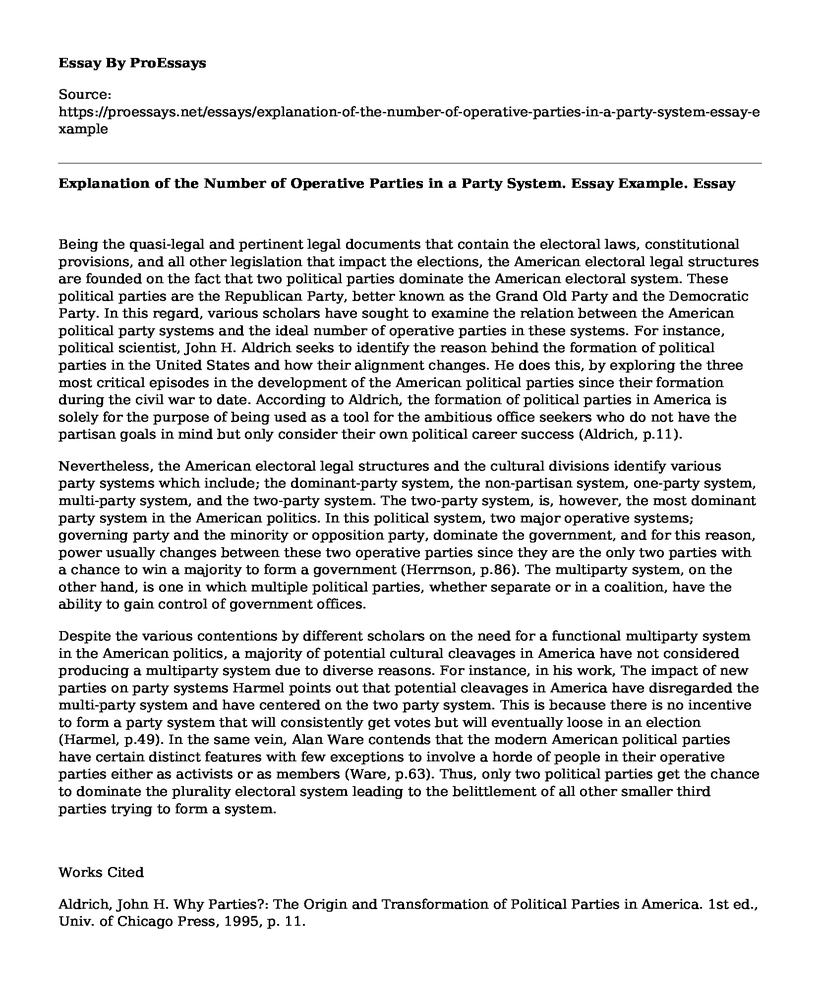Being the quasi-legal and pertinent legal documents that contain the electoral laws, constitutional provisions, and all other legislation that impact the elections, the American electoral legal structures are founded on the fact that two political parties dominate the American electoral system. These political parties are the Republican Party, better known as the Grand Old Party and the Democratic Party. In this regard, various scholars have sought to examine the relation between the American political party systems and the ideal number of operative parties in these systems. For instance, political scientist, John H. Aldrich seeks to identify the reason behind the formation of political parties in the United States and how their alignment changes. He does this, by exploring the three most critical episodes in the development of the American political parties since their formation during the civil war to date. According to Aldrich, the formation of political parties in America is solely for the purpose of being used as a tool for the ambitious office seekers who do not have the partisan goals in mind but only consider their own political career success (Aldrich, p.11).
Nevertheless, the American electoral legal structures and the cultural divisions identify various party systems which include; the dominant-party system, the non-partisan system, one-party system, multi-party system, and the two-party system. The two-party system, is, however, the most dominant party system in the American politics. In this political system, two major operative systems; governing party and the minority or opposition party, dominate the government, and for this reason, power usually changes between these two operative parties since they are the only two parties with a chance to win a majority to form a government (Herrnson, p.86). The multiparty system, on the other hand, is one in which multiple political parties, whether separate or in a coalition, have the ability to gain control of government offices.
Despite the various contentions by different scholars on the need for a functional multiparty system in the American politics, a majority of potential cultural cleavages in America have not considered producing a multiparty system due to diverse reasons. For instance, in his work, The impact of new parties on party systems Harmel points out that potential cleavages in America have disregarded the multi-party system and have centered on the two party system. This is because there is no incentive to form a party system that will consistently get votes but will eventually loose in an election (Harmel, p.49). In the same vein, Alan Ware contends that the modern American political parties have certain distinct features with few exceptions to involve a horde of people in their operative parties either as activists or as members (Ware, p.63). Thus, only two political parties get the chance to dominate the plurality electoral system leading to the belittlement of all other smaller third parties trying to form a system.
Works Cited
Aldrich, John H. Why Parties?: The Origin and Transformation of Political Parties in America. 1st ed., Univ. of Chicago Press, 1995, p. 11.
Harmel, Robert. The Impact of New Parties on Party Systems: Lessons for America from European Multiparty Systems. In Paul S. Herrnson and John C. Green eds. Multiparty Politics in America. Rowman & Littlefield Publishers, Inc, 1997, pp. 43-58.
Herrnson, Paul S, and John C. Green. Multiparty Politics in America: Prospects and Performance. Rowman & Littlefield, 2002, pp. 86. Ware, Alan. Political Parties and Party Systems. Oxford UP, 1996, pp. 63-64.
Cite this page
Explanation of the Number of Operative Parties in a Party System. Essay Example.. (2021, Apr 06). Retrieved from https://proessays.net/essays/explanation-of-the-number-of-operative-parties-in-a-party-system-essay-example
If you are the original author of this essay and no longer wish to have it published on the ProEssays website, please click below to request its removal:
- The United States Congress - Paper Example
- Analytical Evaluation of the George Bush Presidency Essay
- A More Perfect Constitution Conceptual Paper
- Historical Determinism and Marxism Theory Essay Example
- Paper Example on Does the DARE Program Work? Evidence and Findings
- Marxism: A Revolutionary Social-Economic Analysis Approach - Free Essay Sample
- Community Regulating: A New Way to Improve Safety & Quality of Life - Report Example







